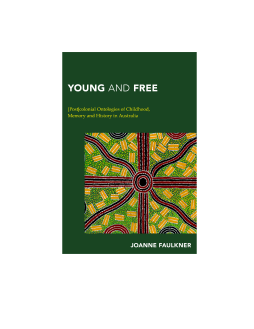
Additional Information
Book Details
Abstract
Tracing the complex yet intimate relationship between a present-day national obsession with childhood and a colonial past with which Australia as a nation has not adequately come to terms, Young and Free draws on philosophy, literature, film and testimony. The result is a demonstration of how anxiety about childhood has become a screen for more fundamental and intractable issues that vex Australian social and political life. Joanne Faulkner argues that by interpreting these anxieties in their relation to settler-colonial Australia’s unresolved conflict with Aboriginal people, new ways of conceiving of Australian community may be opened.
The book engages with philosophical and literary characterizations of childhood, from Locke and Rousseau, to Freud, Bergson, Benjamin Agamben, Lacan, Rancière and Halbwachs. The author’s psychoanalytic approach is supplemented by an engagement with contemporary political philosophy that informs Faulkner’s critique of the concepts of the subject, sovereignty and knowledge, resulting in a speculative postcolonial model of the subject.
Cover artist credit: Lyndsay Bird Mpetyane
Artwork title: Ahakeye (Bush Plum)
[Young and Free] provides an important resource for children’s literary and cultural studies scholars in its sustained account of how the modern concept of childhood colludes with colonialism to displace Indigenous peoples and how this displacement in turn continues to support white settler identity.
This new book by Joanne Faulkner is a welcome attempt to map the longstanding obsession with childhood and a colonial past that still discomforts many, and to unravel the links between the two … It is well-written and engaging and will be read with interest by those working across broad studies of children and childhood. It will also be of interest to postcolonial scholars who will welcome its consideration of a settler-colonial nation’s uneasy attempts to come to terms with its origins.
In this important, expansive and generous book, Joanne Faulkner unsettles persistent themes in Australian discourses of childhood, home and nation, showing the continuing reach of the colonial imaginary in their contemporary idealisations. In particular this book makes a vital contribution to studies of ‘white’ fantasies of origin and their material—and often violent—effects.
Alison Ravenscroft, author of The Postcolonial Eye
Joanne Faulkner is Lecturer in Philosophy and Women’s and Gender Studies, in the School of Humanities and Languages at the University of New South Wales.
Table of Contents
| Section Title | Page | Action | Price |
|---|---|---|---|
| Contents | 7 | ||
| Acknowledgements | 9 | ||
| Introduction | 11 | ||
| Part I: Child | 21 | ||
| Chapter One: Visions of Autonomy: Figures of the Child as Model of the Human | 27 | ||
| Chapter Two: Phantasms of Subjection and the Oblivion of the Other | 47 | ||
| Chapter Three: The Uncanny Child as Postcolonial Unconscious and Conscience | 71 | ||
| Part II: Memory | 99 | ||
| Chapter Four: Children Lost and Stolen | 105 | ||
| Chapter Five: The Child as Witness | 129 | ||
| Chapter Six: Nostalgia, Colonialism and Aboriginal Community | 151 | ||
| Part III: History | 173 | ||
| Chapter Seven: ‘Stronger Futures?’ The Peculiar Temporalities of [Post]colonial Community | 177 | ||
| Chapter Eight: The Emergent Community | 197 | ||
| Conclusion | 221 | ||
| Bibliography | 227 | ||
| Index | 239 |
